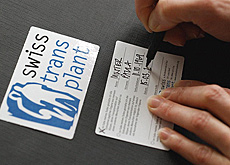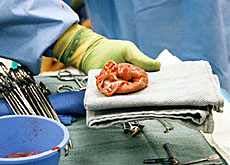Culture plays major role in organ donations

A study shows organ donations could be far more frequent in Switzerland if cultural differences between linguistic regions were taken better into account.
Researchers at Lugano University said that campaigns had to be targeted at specific groups of people to ensure that the number of donations – well below the European average – increases.
People in Italian-speaking canton Ticino are three times more likely to be organ donors than German-speakers and twice more than French-speakers.
The report, published as part of the National Science Foundation’s Implants and Transplants research programme, says that residents of Switzerland’s southernmost canton consider donations as a civic duty, whereas German speakers believe that it is an individual’s decision alone.
Around 1,500 people from the country’s three linguistic regions were polled for the study which was carried out by Lugano University’s Health Care Communication Laboratory.
Peter Schulz, who led the research, said that people’s ideas about life and death had to be considered if the number of donations were to increase.
“We were surprised by the results,” he added. “We thought until now that the good results in Ticino were due to the work of local doctors, but our survey shows that cultural differences play a significant role.”
Today, the number of potential donors is 11 per million inhabitants in the main German-speaking region of Switzerland and 16 in the French-speaking part.
In Ticino, that number rises to 35, not far behind that of the Spanish – the Europeans most likely to donate an organ.
Organ-donor cards
Just over 13 per cent of the German-speaking population has an organ-donor card, far fewer than French speakers.
The researchers said that in German-speaking Switzerland, people tend to consider that individual choices play an important role in healthcare. The same group is also more wary of transplantations.
The inhabitants of Ticino are not particularly enthralled with the idea of dying. Few of them carry donor cards and just over half will agree to a donation.
But they do consider it a duty to perhaps help others, and as a result there are more donors, the researchers found.
French-speakers consider organ donations in a less emotional fashion. Nearly a quarter of them have a donor card, and more than 70 per cent say they are prepared to donate an organ.
Schulz says that different types of information campaigns are needed to address the shortfall in donors. “There are plenty of potential donors out there, but we have to talk to them differently depending on where they live,” he suggested.
The researchers believe that local information programmes are the best approach in Ticino, traditional campaigns are most effective in French-speaking Switzerland while family doctors should do the groundwork in the rest of the country.
Federal law governs transplantations. A donor or the donor’s family must give consent before an organ is transplanted. Trading organs is also outlawed and a donation must remain free.
swissinfo with agencies
In 2005, 1,159 people were waiting for an organ transplant in Switzerland.
413 actually received a transplant, while 38 others died before being operated.
780 people were on a waiting list for a kidney transplant, while 190 were hoping for a new liver.
Switzerland ranks fourth from bottom when it comes to organ donation in Europe.
The first transplant took place in 1964 in Switzerland.

In compliance with the JTI standards
More: SWI swissinfo.ch certified by the Journalism Trust Initiative


You can find an overview of ongoing debates with our journalists here. Please join us!
If you want to start a conversation about a topic raised in this article or want to report factual errors, email us at english@swissinfo.ch.